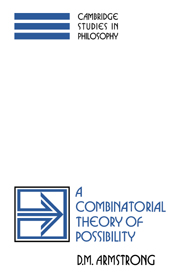Book contents
- Frontmatter
- Contents
- Preface
- PART I NON-NATURALIST THEORIES OF POSSIBILITY
- PART II A COMBINATORIAL AND NATURALIST ACCOUNT OF POSSIBILITY
- 3 Possibility in a simple world
- 4 Expanding and contracting the world
- 5 Relative atoms
- 6 Are there de re incompatibilities and necessities?
- 7 Higher-order entities, negation and causation
- 8 Supervenience
- 9 Mathematics
- 10 Final questions: logic
- Works cited
- Appendix: Tractarian Nominalism, by Brian Skyrms
- Index
10 - Final questions: logic
Published online by Cambridge University Press: 05 June 2012
- Frontmatter
- Contents
- Preface
- PART I NON-NATURALIST THEORIES OF POSSIBILITY
- PART II A COMBINATORIAL AND NATURALIST ACCOUNT OF POSSIBILITY
- 3 Possibility in a simple world
- 4 Expanding and contracting the world
- 5 Relative atoms
- 6 Are there de re incompatibilities and necessities?
- 7 Higher-order entities, negation and causation
- 8 Supervenience
- 9 Mathematics
- 10 Final questions: logic
- Works cited
- Appendix: Tractarian Nominalism, by Brian Skyrms
- Index
Summary
Finally, what of the logical truths? They are necessary, it seems. But can we give an account of such things in terms of our possible worlds?
The problem we face here is part of a more general problem. I postulated a certain structure for the world which yields a certain theory of possibility, and I reasoned about this structure. Possibility was defined using that structure. But if so, what of the status of the postulation and of the theory and, again, the principles of reasoning used in their development? Are they to be taken as necessary truths? If they are necessary, how are they to be brought within the scope of my theory?
If my theory, including my theory of possible worlds, is true, then no exception will be found to the theory in any possible world, thus making the theory necessary. But this seems trivial. If that is all that there is to the necessity of the theory, it does not seem very necessary.
Consider a concrete instance: I postulated a world of states of affairs having individuals and universals as constituents. The constituents, I argued, cannot appear outside states of affairs. But what is the status of this prohibition? Why must it hold ‘in every possible world’?
Again, in defending the theory I had to reason about it. I pointed out what I take to be its consequences – for instance, that it forbids alien universals in other possible worlds.
Information
- Type
- Chapter
- Information
- A Combinatorial Theory of Possibility , pp. 138 - 140Publisher: Cambridge University PressPrint publication year: 1989
